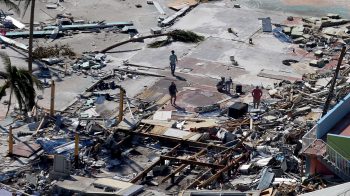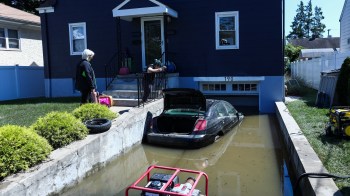Calm skies bring windfall for insurers
Share Now on:
Calm skies bring windfall for insurers
BOB MOON: Folks along the Gulf Coast can start breathing a little easier. Hurricane season officially ends tomorrow. This year, the entire country got a breather: Not a single major hurricane made landfall in the U.S.
Thousands of those left homeless by last year’s big hurricanes got another reprieve today. A federal judge has ordered the Bush administration to resume making housing benefits available.
And flood victims in New Orleans have won a legal battle over insurance coverage. The carriers had argued policies did not cover man-made disasters, like levees bursting. But a judge says they must pay for water damage. If that ruling is upheld, the insurance industry could be forced to pay out billions more. But as Dan Grech reports from WLRN in Miami, the industry should be able to take the blow.
DAN GRECH: A curious thing happened after the winds died down from Hurricane Katrina. People bought insurance.
ROBERT HARTWIG: Unfortunately, people run out and buy insurance oftentimes after something happens.
That’s Robert Hartwig with the Insurance Information Institute.
HARTWIG: And that’s because the reality of their precarious situation becomes very real to them. Events like Hurricane Katrina make people very aware of their vulnerabilities, and they seek to transfer that risk to a third party, and insurers are that third party, typically.
But that surge of new customers came at a bad time. Insurers were tapped out; they paid $41 billion in claims after Katrina. They didn’t have the cash on hand to write all those new policies.
What happened next was unprecedented. Investors poured $30 billion into financing insurance companies.
HARTWIG: Despite the risk, there are investors around the world who are literally willing to pour tens of billions of dollars into a very, very risky enterprise in a very short amount of time.
Most of that financing flowed into Bermuda. That’s the capital of reinsurance — insurance companies for insurers. Brad Kading is with an industry association in Bermuda.
BRAD KADING: It would be the largest amount ever raised in such a short period of time, really a record-setting amount.
Nine reinsurers started up this past year alone. And they made money hand over fist.
KADING: 2006 is going to be a very good year.
GRECH: Um, how good a year?
KADING: Um, I don’t really know how to measure that. Some of the companies are going to be able to report rates of return to their investors of about 20 percent or 25 percent on the dollar.
Meanwhile, homeowner premiums are through the roof. Coastal coverage has tripled and quadrupled in price. Some premiums rose more than 10 times in the past year.
As you might expect, there’s been a consumer backlash against insurers. But after two years of record payouts, the insurance industry is holding its ground. The Insurance Information Institute’s Robert Hartwig:
HARTWIG: Well, insurance is a long-run proposition. There are going to be some years we’re going to lose considerable amounts of money. But that means that has to be balanced by years where insurers have the opportunity to earn money.
One reason for the increased premiums is science. Meteorologists predict more and stronger hurricanes in coming decades, so insurers expect more claims. But there’s another reason.
Jay Guin measures hurricane risk for insurance companies. He’s with A.I.R. Worldwide out of Boston. He says there’s been a building boom in the areas most vulnerable to hurricanes.
JAY GUIN: Nobody talks about that. However, that’s fact, and that is real, and that’s really driving a huge increase in the risk we have witnessed.
Coastal states have seen a 30 percent increase in new homes. That means lots more property to lose when the next big one hits.
In Miami, I’m Dan Grech for Marketplace.
There’s a lot happening in the world. Through it all, Marketplace is here for you.
You rely on Marketplace to break down the world’s events and tell you how it affects you in a fact-based, approachable way. We rely on your financial support to keep making that possible.
Your donation today powers the independent journalism that you rely on. For just $5/month, you can help sustain Marketplace so we can keep reporting on the things that matter to you.


















